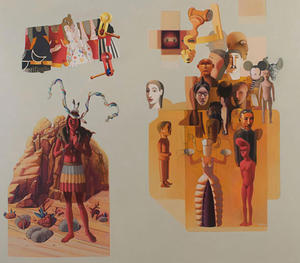BROTHER DAVID'S LAST MISSION
 Change occurs when fun runs out and I was ready for big changes after the long period of revision of the three large Macumba oil paintings. A change of medium also seemed like a good idea so with an eye on the collaged based paintings of the 70's and 80's and a more idiosyncratic approach, I invested in a full set of acrylics and stretched some large canvases primed with an acrylic gesso. AR
Change occurs when fun runs out and I was ready for big changes after the long period of revision of the three large Macumba oil paintings. A change of medium also seemed like a good idea so with an eye on the collaged based paintings of the 70's and 80's and a more idiosyncratic approach, I invested in a full set of acrylics and stretched some large canvases primed with an acrylic gesso. AR
'Brother David's Last Mission.' 2009/10
The first stage of this work was very colourful with large areas of reds and yellows. The first image to appear was the Indian. I had used him in a small watercolour, working from a plaster figurine bought in a market in Rio. The Indian or Cobloco, appears to be a combination of native Brazilian and North American Indian.. certainly a symbol of freedom in a slave culture. He is usually presented carrying a deer carcass across his shoulders.
(In the painting, the reference for his background came much later from a DC western comic.)
As the work developed I began to mix other references from the market ..toys, childrens' carnival costumes, masks, along with ex voto heads and figures from the museum. My version of Yemanja is matched with a punk Barbie and a toy aesthetic prevails. The young priests head emerged as I painted a group of Ex Voto heads and became a likeness to a cousin who in a previous life was a Christian Brother .Br David.
Last Mission refers in part to a collage based installation by Ovind Fahlstrom 1966 Venice Biennale where painted comic cut-outs were presented, floating against a cream background.( Fahlstrom is an acknowledged early influence) The combination of large scale, fast drying paint and quick changes in images was a liberation after the endless revision of the previous works in oil.
I can see clear connections between the new paintings and the collage-based works from the 70's and 80's, without the rigidity of method on which the early works depend.
Alan Robb14th July 2011

